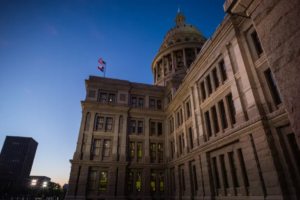A bill to bar Indiana state colleges from restricting protests based on ideology passed overwhelmingly in the House Thursday — even though the legislation essentially duplicates federal First Amendment protections.
Universities have stopped short of supporting the bill, but said they agree with its ideas. Bill critics questioned why a state law is necessary when federal protections exist. They also warned the bill if signed into law could encourage litigation and complicate First Amendment case law.
Spurred by complaints from conservative and religious groups, House Bill 1190 would codify federal free-speech protections into state law and also allow students and student groups to sue for damages.
The bill would prevent state education institutions from prohibiting protests or leafleting on certain areas of campus or denying those rights to student groups based on their ideology.
Co-author Rep. Chris Jeter (R-McCordsville) cited examples of conservative and religious groups facing alleged discrimination on college campuses in explaining the origin of the bill. Still, he said the bill was neutral and didn’t distinguish among points of view.
Jack Jordan (R-Bremen), the author of HB 1190, also said the bill was not a Democrat or Republican issue, but stemmed from the First Amendment.
“This is a ‘we’ issue, that we all should be — and I’m assuming are — excited about,” Jordan said in presenting the bill.
HB 1190 received near-unanimous support from public speakers and other lawmakers, though Rep. Ed DeLaney (D-Indianapolis) questioned why it was necessary if the U.S. Constitution and Supreme Court rulings have affirmed First Amendment rights on college campuses.
It’s not necessary to put existing federal protections into state laws, said Sheila Kennedy, a professor emeritus of law and public policy at the Paul H. O’Neill School of Public and Environmental Affairs at IUPUI — and doing so inaccurately could create legal headaches for schools.
“There’s no legal reason to codify it. It is the law,” Kennedy said. “State legislatures do not have to go back every time the Supreme Court makes a law inapplicable. If the Supreme Court comes down with a decision, a law may stay on your books, but it is no longer in effect.”
Kennedy said HB 1190 encourages additional litigation, and complicates the legal precedent of the First Amendment and existing case law by potentially allowing somebody to claim they have additional rights under Indiana law.
Specific provisions of the bill — like one prohibiting colleges from denying a benefit to student organizations based on their ideology — could require schools to recognize and fund white supremacist student groups, she said.
“Even if their intent was not to protect student groups with abhorrent views, that certainly could occur under this language,” she said.
Jeter said the purpose of adding the language to state law is to provide additional guidance to universities.
“We’ve seen universities attempt to craft policies just based on the First Amendment, which is very broad, and those policies have oftentimes veered away… from some of the case law,” Jeter said. “(Universities) want to propagate rules that are fair, lawful, and viewpoint-neutral for all students.”
The bill says it should not be construed to prevent universities from restricting non-protected speech, such as threats or harassment, or conduct that “materially and substantially” disrupts the protected activity of another individual.
In an interview, Jeter said the bill pares down years of case law into specific guidance for schools to follow.
The enforcement provision — which allows students or student organizations to sue schools for violations — is novel, but Jeter said schools would likely be open to legal action even without it.
Jeter said he had met with Indiana schools about this bill
Indiana University hasn’t taken a position on the bill, spokesperson Chuck Carney said.
“We appreciate that it largely mirrors our existing policy, and especially appreciate that the legislature has worked with the public universities as they continue to refine the legislation,” Carney said in a statement.
Speaking to lawmakers on behalf of IU, Ivy Tech, and Ball State, Zachary Smith Howard, assistant director of state relations at Indiana University, said the universities were committed to First Amendment protections.
“Our institutions recognize the rights of all members of the campus community,” he said. “This is essential to the advance of each of our institutions’ educational measures.”
Jeter said the bill was a response to “national trends towards suppression of speech,” citing certain challenges that student groups have faced to their freedom of association.
He said higher education institutions in Indiana have been generally good about protecting First Amendment rights, but that they’ve still seen a handful of complaints, including a 2018 lawsuit by a pro-life group at Ball State University that claimed the school had unfairly denied them student activity funds.
An IUPUI graduate also told House lawmakers during testimony that her pro-life student group had been held to different standards than other student groups, including by having a display confined to a small area enclosed by bike racks.
Asked if the bill aimed to protect conservative viewpoints at traditionally liberal college campuses, Jeter said, “Those are the ones you see most in the news.”
However, he added that “there are reports of liberal groups on more conservative campuses also being marginalized.” The bill, he said, is politically neutral.
It’s not Indiana’s — nor Jordan’s — first foray into college free speech.
Last year, the state passed a law requiring universities to survey students on free speech by May 2022, in order to gauge whether students felt their schools “recognized and fostered” the free expression of opinions and ideologies.
Jordan separately had proposed that universities identify the ideological leanings of professors, courses, speakers, and student groups, according to the IndyStar.
Last year’s bill also required the Commission on Higher Education to create a report on free speech at higher education institutions, which was issued on Nov. 1.
This article was originally posted on Indiana bill would duplicate First Amendment protections at colleges






Be First to Comment